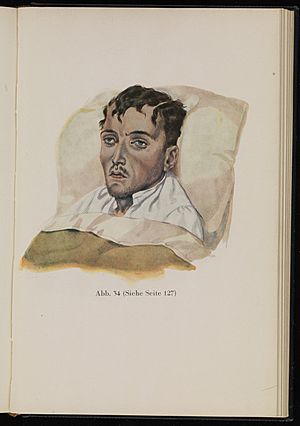Dysentery facts for kids
Dysentery is a serious illness that causes severe diarrhea. It happens when tiny germs called bacteria attack your intestines. These germs make your intestines swell up and hurt. One of the main signs of dysentery is seeing blood in your poop.
People with dysentery might also have a high fever and a lot of pain in their stomach. Doctors usually treat this illness with special medicines called antibiotics. Because the diarrhea is so bad, dysentery can be very dangerous if not treated.
Contents
What is Dysentery?
Dysentery is an infection of the intestines. It causes the lining of your intestines to become inflamed, which means they swell up and get irritated. This swelling leads to the main symptoms of the disease.
Causes of Dysentery
Dysentery is usually caused by different types of bacteria. The most common type is called Shigella. When these bacteria get into your body, they attack the cells in your intestines. This attack causes the severe symptoms you see with dysentery.
Common Symptoms
The most noticeable symptom of dysentery is diarrhea that often contains blood or mucus. Other symptoms include:
- Stomach cramps and pain
- High fever
- Feeling sick to your stomach (nausea)
- Throwing up (vomiting)
- Feeling like you need to poop, even after you just did (this is called tenesmus)
These symptoms can make you feel very weak and tired.
How Dysentery Spreads
Dysentery spreads easily, especially in places where hygiene is not very good. It is often called a "fecal-oral" disease. This means the germs from an infected person's poop somehow get into another person's mouth.
Ways Germs Spread
- Contaminated Food and Water: Eating food or drinking water that has been touched by infected poop. This can happen if someone who is sick doesn't wash their hands properly after using the bathroom.
- Direct Contact: Touching surfaces or objects that have been contaminated with the bacteria, and then touching your mouth.
- Flies: Flies can carry the bacteria from poop to food.
Preventing Dysentery
Preventing dysentery is mostly about good hygiene. By following simple rules, you can greatly reduce your risk of getting sick.
Top Prevention Tips
- Wash Your Hands: Always wash your hands thoroughly with soap and water. Do this especially after using the bathroom and before handling food.
- Safe Food and Water: Make sure your drinking water is clean and safe. If you are unsure, boil water before drinking it. Cook food properly and keep it covered to protect it from flies.
- Cleanliness: Keep your home and surroundings clean, especially bathrooms and kitchens.
- Avoid Contaminated Areas: Be careful when traveling to places where dysentery is common. Stick to bottled water and well-cooked food.
Treating Dysentery
If someone gets dysentery, it's important to get treatment quickly. This helps to prevent serious problems like dehydration, which is when your body loses too much water.
Medical Treatment
- Antibiotics: Doctors usually prescribe antibiotics to kill the bacteria causing the infection. The type of antibiotic depends on the specific bacteria.
- Rehydration: Because of severe diarrhea, people with dysentery lose a lot of fluids. Drinking plenty of clean water and special rehydration solutions (like oral rehydration salts) is very important to replace lost fluids and salts.
- Rest: Getting enough rest helps your body fight off the infection and recover.
Images for kids
-
A Red Army soldier dies of dysentery after eating unwashed vegetables. This is a common way of contracting dysentery. From a health advisory pamphlet given to soldiers.
See also
 In Spanish: Disentería para niños
In Spanish: Disentería para niños
 | Bayard Rustin |
 | Jeannette Carter |
 | Jeremiah A. Brown |




